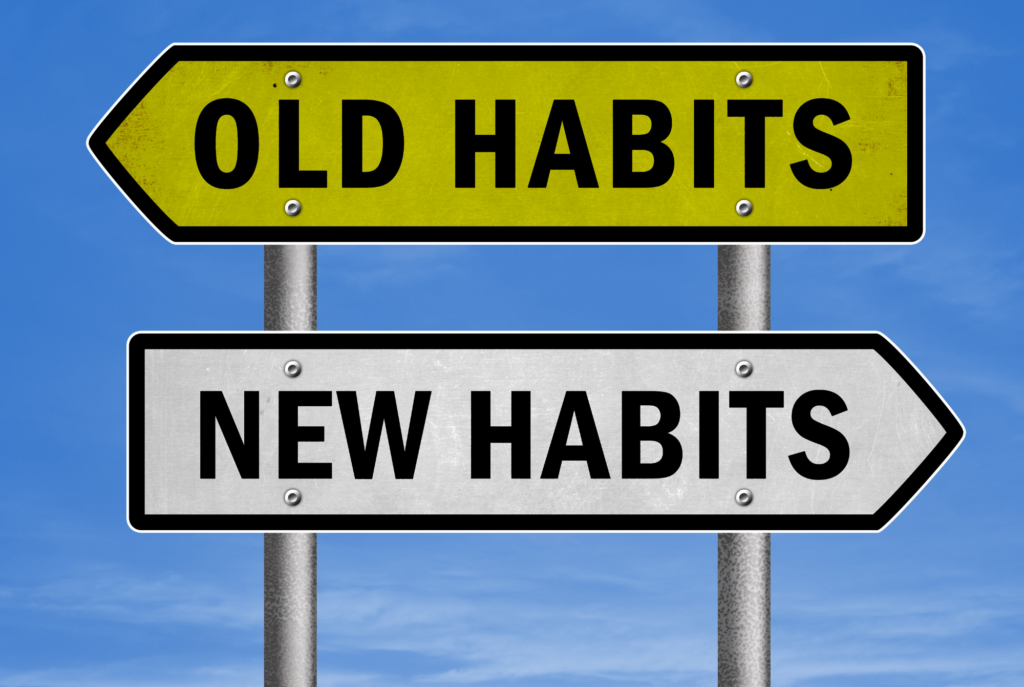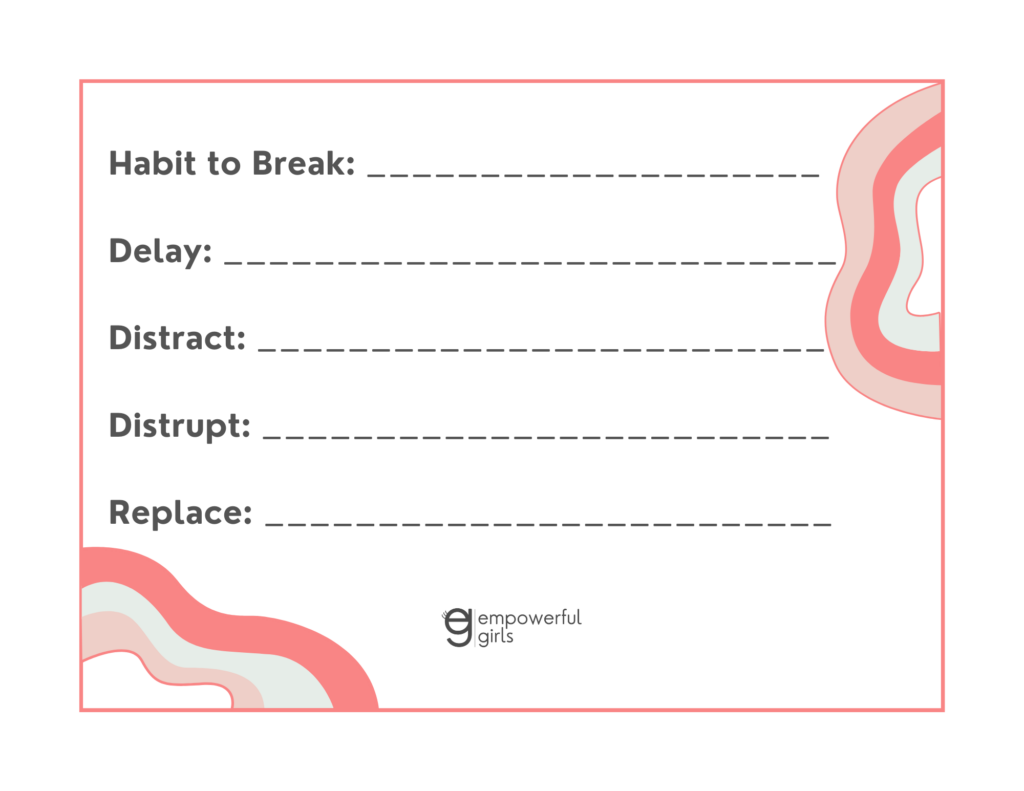
Make + Break Habits
Do you have any new habits you’ve been wanting to make … or old habits you’ve been wanting to break? That’s ok–me too! If starting or ending habits were easy, we’d all be doing it. But it’s not easy, habits take work; AND I still think you can do it. So let’s help you learn how.
First I want to establish that in this episode I will not be referring to habits as either “good” or bad. I think the language we use has a powerful effect on us even subconsciously. When we assign a label or judgment, like a “bad habit,” we sometimes view ourselves as bad too, which can lead to us feeling shame. And I don’t want that for you. So instead I’ll be calling them habits we want and ones we don’t, or habits we wanna make and ones we wanna break.
Habits You Have
Habits don’t just happen accidentally or even instantly. Habits form from repeated choices. Some of our habits are things we do so much, they are seared in our brains and we do them without having to think about them or even choose them; they’re just part of how we live. Some examples: buckling a seatbelt, blocking a cough or sneeze, wearing shoes outside or taking them off indoors, brushing your teeth before bed, checking your phone. I’m trying to point out that you HAVE formed many habits in your life already. You’ve also stopped doing some habits, too, as you’ve gotten older, like maybe you no longer read books aloud and only read silently now, you don’t grab your parent’s hand when you cross the street like when you were little, or you don’t style your hair the same way you did two years ago. My point is, you are already a habit maker and habit breaker; you already have the ability, and can do it again.
Break a Habit
Let’s discuss habits we want to break. Think about one of your habits that falls into this category. For me a habit I want to change is staying up late even though I know I have to wake up early. Other ideas for habits you might want to break are skipping breakfast, running late, not studying, biting your nails, excessive screen time, lying, etc. Pick one, and let’s explore how to break it. The fact that you’re mindful enough to identify a habit you no longer want shows that you have awareness of it; you already know that you want to make a change. That right there is a very important first step.
Why Tho?
Now I want you to think about WHY: why do you no longer want this habit? Maybe it’s causing you stress, or you want to improve your grades, or you hope to repair a relationship, or you don’t like how it makes you feel physically/mentally, or you’re prioritizing hygiene, or another reason that you want to break this habit. Also ask yourself why you don’t want to break this habit. Maybe you like the temporary boost you feel, or it’s less work for you, or you aren’t sure what to do instead. Hold space for both why you do and don’t want to change this habit. Explore your whys and figure that out.
Cues Clues
Next I want you to think of a time you did that habit you want to break, and try to remember what happened before you did it. What was the cue, what led to you repeating that habit? Was it a specific event, like whenever you reach over to turn off your phone alarm, right away you check social media. Was the cue an emotion, like whenever you feel nervous during an exam you bite your nails. Or was the cue a person, and you tend to do this habit when you’re around them. Think about what happens before your habit.
Path in the Snow
So far you’ve identified what habit you want to change, why you want to change it, and what the cue is. Can you just stop doing it then? Maybe, but most of the time it’s hard to just drop a habit abruptly. Routines can be difficult to change, we get so used to doing something that it feels uncomfortable to switch to something else.
Think about it like this. If you walk across a field covered in snow, you’ll create a path. And the next time you cross the snowy field, you take the same path because it’s already there, it’s less work, your shoes won’t get as wet. When it snows, you keep taking that same path and the trail gets more packed down while the sidewalls get deeper with snow. Over time this path you carved through the snow becomes very familiar to you. Then one day you decide not to go that way, and start crossing the snowy field in another spot, a different direction. You only get a few steps in when you notice your pants are soaked from wading in the snow without a path. The ground feels unfamiliar, and you feel uncomfortable and unsure. You remember the other path and consider going back–you’ve already carved that path well, it would take less effort than this. But you keep going and make a new path, stumbling along the way, but sticking to your plan. And every time you choose to take this new path, it becomes more apparent and familiar to you.
Switch Your Habits
Habits work in a similar way: changing them can be a challenge at first, but over time the new habit becomes your go-to. So how can we switch our habits? When you feel the urge to do the old habit or notice when you’re doing it again, try one or more of these tactics: Delay, Distract, Disrupt, Replace.
Delay
Instead of acting on your impulse, make yourself wait. Psychotherapist Natacha Duke shared, “Delaying the behavior, even for 15 minutes, can lower the temptation.” Say you’re reading for a book report, and you have the urge to play a video game instead. Delay the impulse and keep reading for 15-30 minutes. Maybe the story will pull you in and you read even longer. Delaying will at least get you further into the book so you have less pages left.
Distract
Decide ahead of time what you can do to divert your attention away from the habit. Maybe you want to spend less time streaming shows. Distract yourself by doing something without screens so the temptation isn’t there. Go for a walk, bake something from a physical cookbook, play a game with your sibling in a room without a TV or device.
Disrupt
Make the habit harder to do. If you keep sleeping through your alarm, move your phone/alarm clock to the other side of the room so you have to physically get up to turn it off. No snooze button either. Or if you want to stop biting your nails, disrupt the habit with bitter-tasting nail polish or keep a fidget toy handy so it gives your fingers something else to do. Or if you want to spend less time on your phone, make your passcode complicated so you have to decide whether it’s worth typing it out just to get to your apps.
Replace
Sometimes we need a new habit to replace the old habit with. If you want to break the habit of running late, replace it with a habit of being ready to go or leaving 10 minutes earlier than you normally would. Or make a habit every school night to pack your backpack, fill your water bottle, and plan your outfit so you have less decisions to make and less things to do in the morning, saving you time so you don’t run as late. Or replace a half hour of scrolling social media every day with a half hour of making bracelets, drawing, playing an instrument, or studying a language. Choose something more resourceful and enriching.
When creating and maintaining a new habit, you can use the SMART Goals from episode 06 to make a Specific, Measurable, Attainable, Relevant, and Timely goal (S-M-A-R-T). Select an accountability buddy, choose rewards, and remember to PLAN for obstacles. Like my snowy field analogy, you might stumble along the way as you make a new habit path, and that’s ok. Have patience with and compassion for yourself. New habits take effort, time, and repetition. You’ll get better at the new habit, it’ll get familiar. Author Gretchen Rubin said, “We can use decision-making to choose the habits we want to form, use willpower to get the habit started, then – and this is the best part – we can allow the extraordinary power of habit to take over. At that point, we’re free from the need to decide and the need to use willpower.” Eventually our habits become our routines, we’ve already chosen THEY are how we want to live.
Examine your habits and consider which ones you want to keep, others you want to break, and new ones you want to make. Habits are a huge part of our lives. They shape us as we grow. Chinese philosopher Lao Tzu said, “Watch your thoughts, they become your words; watch your words, they become your actions; watch your actions, they become your habits; watch your habits, they become your character; watch your character, it becomes your destiny.”
Habits Poster + Worksheet Printable
I created an “Habits” poster with that quote and “Delay, Distract, Disrupt, Replace” worksheet for you to print out, personalize, and post on your wall where you’ll see it, remember it, practice it, and believe it — that’s the important part.
Resources
If you have a topic suggestion, I’d love to hear from you! Send an email (tweens get the OK from your parents) to hello@EmpowerfulGirls.com .
If you have social media already, follow me on Insta or tiktok @empowerfulgirls. I’m not encouraging or endorsing social media, but I’m on there to offer an unfiltered, uplifting alternative to what’s in your feed. Remember to get on the email list for the newsletter!
